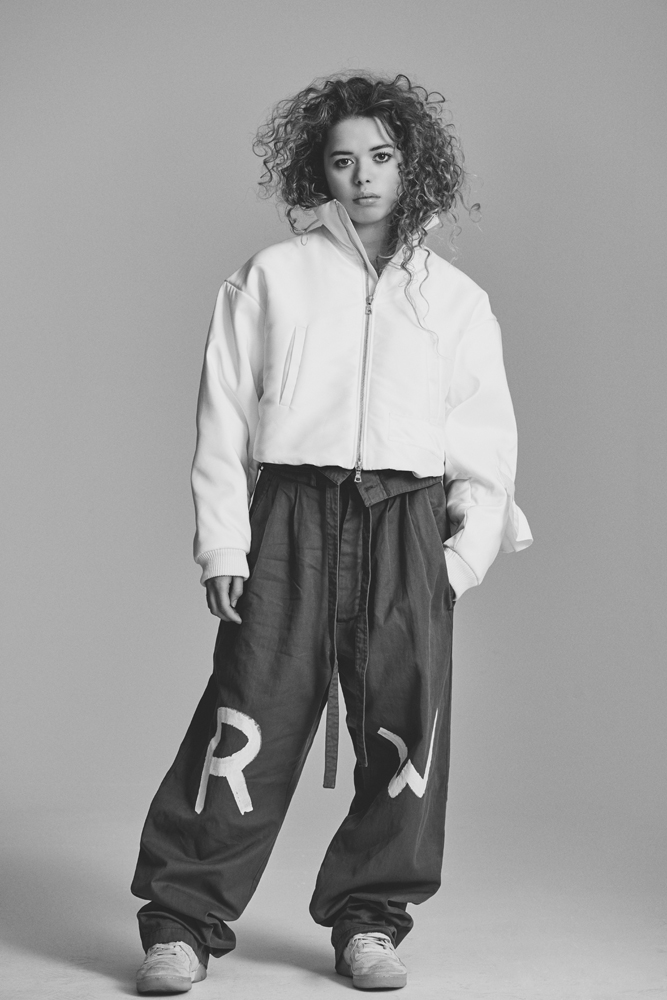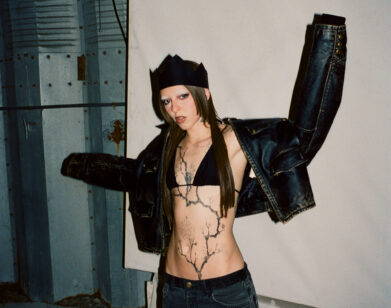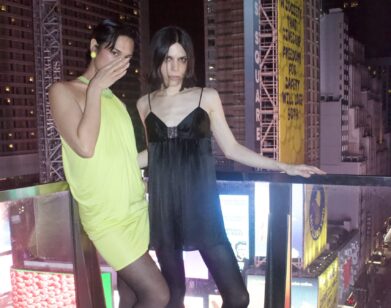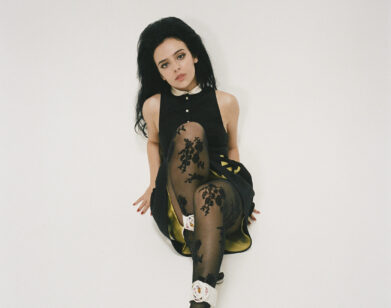Discovery: Nilüfer Yanya
NILÜFER YANYA IN LONDON, OCTOBER 2016. PHOTOS: PHILIP SINDEN. STYLING: KELLY-ANN HUGHES. HAIR: SVEN BAYERBACH/CAROL HAYES MANAGEMENT USING BUMBLE AND BUMBLE. MAKEUP: ROBERTA KEARSEY USING NARS COSMETICS. PHOTO ASSISTANT: CHRIS BROMLEY. STYLIST ASSISTANT: SYBILLE SPECK. SPECIAL THANKS: THE RUSSIAN CLUB AND RED COLLAR.
“Even before I left school, I decided this was what I wanted to do,” says Nilüfer Yanya. The English singer-songwriter has made music, one way or another, since she began playing classical piano at age six. Taking it seriously wasn’t a choice as much as it was a given; after piano Yanya learned cello, then guitar, before beginning singing and songwriting when she entered secondary school. Now, at age 21—five years after she started posting stripped down acoustic demos online—she has forgone university and released two tracks (“Small Crimes” in August and “Keep on Calling” in October) that together form her debut EP Small Crimes (Blue Flowers).
Below, we’re pleased to premiere Danish producer Vasco’s remix of “Keep On Calling.” Yanya wrote the song a few years ago, and it has gone through multiple iterations, including an early demo with an entirely different guitar arrangement and a version produced by her uncle. This remix combines Yanya singing about being “tired of your games” with a more synthetic sound, though her gravelly voice still lends a sultry depth to its vocals.
Yanya recently returned from volunteering in Athens at a refugee camp—distributing clothing and food as well as leading art workshops—and is currently at work on an EP, which she’s treating “like a mini-album,” conceptually tying together songs written over the past year.
NAME: Nilüfer Yanya.
AGE: 21.
BORN & BASED: London, England.
GOING IT ALONE: Originally I wanted to be part of a band; I wanted to be in a band, and I didn’t want to be the singer. When I started writing, I realized that I liked writing myself, and I liked seeing the whole idea through before other people would possibly get involved and want to change things. You get used to that control over it, and it’s really nice for it to all be yourself—your own ideas—and then adding other things to it and other people’s ideas.
PEN TO PAGE: Normally I come up with an idea, a music idea on the guitar or something—it’s the perfect way to write a song [laughs]—and then I’ll think of something, like a melody, that would work with that. At the same time as you’re coming up with the melody, you get certain words stuck in [your head], and you build the rest of the lyrics based on those certain words. It’s almost like an image enters your head of the melody and what the words are about. The best way is to write a song all at once, or all in one day, or all in two hours, because it’s easiest that way. Sometimes when you leave it too long, if you write a verse and then the chorus, even writing the other verses can be a lot harder. You have to go back to that place, and it’s really hard to go back there mentally without it sounding too contrived or cheesy.
It’s [all] from my perspective—I couldn’t say I’m writing from anyone else’s perspective—it’s my perspective even if I’m writing from another perspective. It’s my perspective of their perspective. It’s not like I’m trying to get into someone’s head, but I’m thinking, “If I was that person, what would I be thinking?” I’m not trying to say, “Oh, this is how this person would feel.” It’s how I can see feeling like that.
WHEN SOMEONE FIRST SAID “YOU HAVE A GOOD VOICE”: It was my teacher at music school, and I think I cried. [laughs] It was really nice. I was happy. I also really liked singing, but I never thought I could do it. It was a release, like, “Oh, I can sing! Yay.”
THE PARENTAL INFLUENCE: They’re both artists, so [they’re] very creative. I’ve always seen them doing their own work, so there’s a sense you get that, “This is what you do. You do your own work.” That’s kind of how I was brought up, just creating your own things, and you’re allowed to practice that and do that.
BARING IT ALL: It’s always hard when you really know someone well to show them your work. It’s like your insides, in a way. It’s a bit too much. [laughs] It’s easier to just be like, “Oh yeah, I wrote this song,” [to a producer] because you don’t know what they’re like, so you don’t really bother about if they like it or not. I think when I was younger it was harder, but now I find it a bit easier just to play a song to anyone. I like everyone’s feedback.
EMBRACING MINIMALISM: What I like most about music is when it sounds like music. I like production, I like listening to interesting production, but it’s not what I find the most exciting. I really like music when it’s quite clear and simple. I always liked the sound of just a piano or just guitar or just drums. It makes it a bit less fussy … you hear it more clearly. I think that my songs come across best in that way, because I write them on real instruments.
ON THE MIND: I would like to travel more and play shows in different places. I’d like to work on the live side of it more and how that reflects the music I’m writing or what I’m trying to say. I would like it to have more meaning as well—the whole thing when it comes together. If it could say something that would be cool. I have a lot of ideas, but a lot of them I don’t follow through on, which is bad and good. I think I’m quite selective and I don’t want to put everything out, because I don’t think a lot of it is any good. I’d like to think in the next year I would see this first release [and see] I’ve improved a lot; I would’ve made something that I thought was better developed. I think it’s because I didn’t go to uni, so I feel like I have to be critical about it; I can’t just let it slip out.
NILÜFER YANYA WILL RELEASE A LIMITED EDITION 12″ VINYL OF SMALL CRIMES (BLUE FLOWERS) ON NOVEMBER 11, 2016. FOR MORE ON YANYA, VISIT HER FACEBOOK.







